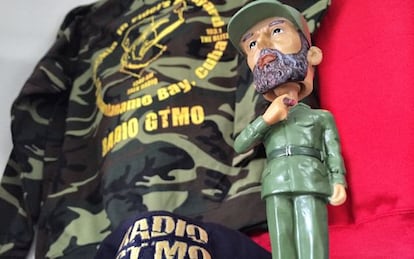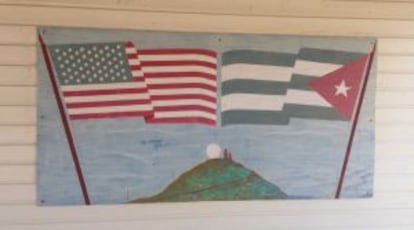Guantánamo Bay: A test case for resetting US-Cuban diplomacy
The normalizing of relations between the former enemies marks a new era on the base

American soldiers find it easy to feel at home at the Guantánamo Bay naval base in Cuba. They pay in dollars, eat at the same fast-food restaurants they’d find at home, buy the same products in supermarkets as they do in the United States, watch American TV and are ferried around in yellow school buses.
But after a while, inconveniences arise. The internet access speed is appalling. If they want to receive a package from the United States they need money and patience. And certain foods suddenly become unavailable. But most important is that vital difference with respect to other military bases: they cannot leave Guantánamo.
There is one vital difference here with respect to other military bases: the marines cannot leave Guantánamo
The naval base is an island within an island. The United States controls 116 square kilometers of territory in a country with which it broke off diplomatic relations in 1961. There is no other base in the world that operates under these circumstances.
The 28-kilometer border is demarcated by two three-meter-high fences, between which lies a neutral territory filled with land mines and cactus. Watchtowers eight meters tall dot the border of this dry and mountainous landscape. Young marines bearing arms are always on guard. US planes monitor the turquoise waters of the Caribbean Sea.
Security risks at the base are minimal, apart from two or three Cuban citizens who come every month to ask for asylum. In fact there have been no significant incidents at the base since it was established in 1903. Guantánamo was leased out to the US in exchange for bringing an end to its military occupation of the island after the Cuban War of Independence against Spain.
Guantánamo is an example of military cooperation with the enemy: since the early 1990s, the base’s chief commander meets with a Cuban border official every month, and for the last seven years the two nations have carried out joint emergency exercises every year. There are even some signs of mutual understanding: both countries play their national anthems, sometimes you can spot their two flags together and the base even sells Cuban souvenirs.

Long gone are the tensions of the 1950s when Cuba cut off the water supply to the base (Guantánamo is now self-sufficient), and its soldiers threw rocks onto the roofs of the marines’ homes to disturb their sleep.
After the United States and Cuba recently announced that they would re-establish relations, Guantánamo – which has had a terrible reputation since 2002, when a prison facility for terror suspects was opened there – became a test case for US-Cuban diplomatic relations.
Caution is the official policy. “Nothing has changed for us,” says base spokesperson Kelly Wirfel in an interview to a small group of journalists who visited Guantánamo in the last week of April.
But Wirfel admits that normalizing relations has begun a new era, and, if proposed changes are carried out, they will have an impact on this desolate base, which houses 6,000 people. The question is when. “It could be in two or in 20 years – who knows,” she explains.
Long gone are the times when Cuba cut off the water supply and its soldiers threw rocks at the marines’ homes
Supplies arrive by ship every three weeks, and this arrangement has a knock-on effect. The Irish pub in Guantánamo offers fewer dishes as the next arrival approaches and there is an active business trading used cars. Bringing a vehicle over by boat costs $5,000. Because of the expense, departing soldiers sell their cars on base for about half the price. They usually trade among friends to save money. And, given the high cost and limited access to new auto parts, they keep repairs to a minimum. A grey vehicle may have a blue door and a different kind of wheel on each corner.
Cuba and the United States have not discussed Guantánamo during recent talks about normalizing relations – a condition that was imposed by Washington. The Communist government has been asking – and it reiterated its request after they announced renewed diplomatic relations in December 2014 – for the base, which they consider illegal, to be returned. In January 2015, the United States once again said it ruled out that possibility, claiming that the lease on the base will remain in force unless both parties decide to dissolve the agreement.
The United States paid 2,000 gold coins in rent for the base every year until 1934. Since then, it has paid $4,085. The checks arrive by mail but Cuba has never cashed them – that would damage its national pride.
The Pentagon considers the base, its oldest overseas naval facility, a strategic location. It started as a coal refueling station for ships and in the 1990s it housed 40,000 immigrants who were trying to reach the United States by sea.
Cuba and the US have not discussed Guantánamo during talks about normalizing relations, a condition imposed by Washington
Before 1959, Guantánamo was just another base: American soldiers could go to Cuba and around 3,000 Cubans entered the base every day to work. But after the revolution brought Fidel Castro to power, the United States forbid soldiers from leaving and hired Jamaican and Filipino contractors instead. Cubans who had been working on the base continued to have access. The last two Cuban nationals to work there retired in 2012. Another 350 employees asked for asylum on the base. Today there are only 28 of them there; they are retired workers who live in a special area, in small, brightly painted houses.
“I would love to go to Cuba,” says 26-year-old US soldier Raúl Sánchez. He has been serving on the base for the last six months, and has three months left. The base welcomed the news of renewed relations between the United States and Cuba with enthusiasm. Sánchez had direct contact with the locals during past assignments in Kosovo and Afghanistan. But all that is very far away now, he says. “We will be the last ones to see it,” he says in reference to the need for security agreements with the host country, so that military personnel can leave the facilities.
His only contact with Cuba has been through Cuban radio stations that they hear on the base. On the other hand, Guantánamo’s own Radio GTMO is restricted to the military zone. Still, the studio has been selling t-shirts and dolls with the motto “Rockin’ in Fidel’s Backyard” on them for the past 15 years.
“It was a form of promotion and the money goes to the community,” says Steven Jacuini, the station’s engineer. But if the United States and Cuba restore full diplomatic relations, they will “mostly likely” remove those products. It may also no longer make sense to sell t-shirts bearing maps of Cuba with the slogan: “Close but no cigar.” And maybe there will be real Cuban products among the cigars and rum bottles found in Guantánamo supermarkets.
Tu suscripción se está usando en otro dispositivo
¿Quieres añadir otro usuario a tu suscripción?
Si continúas leyendo en este dispositivo, no se podrá leer en el otro.
FlechaTu suscripción se está usando en otro dispositivo y solo puedes acceder a EL PAÍS desde un dispositivo a la vez.
Si quieres compartir tu cuenta, cambia tu suscripción a la modalidad Premium, así podrás añadir otro usuario. Cada uno accederá con su propia cuenta de email, lo que os permitirá personalizar vuestra experiencia en EL PAÍS.
¿Tienes una suscripción de empresa? Accede aquí para contratar más cuentas.
En el caso de no saber quién está usando tu cuenta, te recomendamos cambiar tu contraseña aquí.
Si decides continuar compartiendo tu cuenta, este mensaje se mostrará en tu dispositivo y en el de la otra persona que está usando tu cuenta de forma indefinida, afectando a tu experiencia de lectura. Puedes consultar aquí los términos y condiciones de la suscripción digital.








































